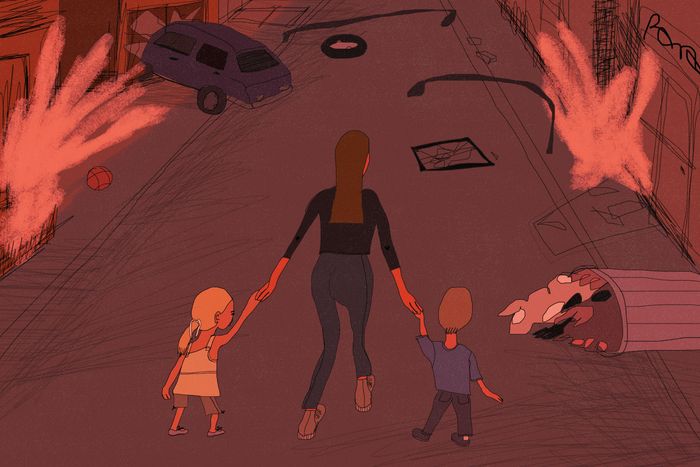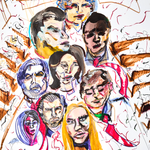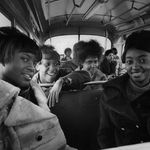
This article originally appeared in Brooding, a newsletter delivering deep thoughts on modern family life. Sign up here.
Cormac McCarthy died earlier this month, and none of the tributes I’ve read have mentioned what I consider his most important contribution to the American literary canon: He wrote the best parenting book of all time, The Road.
Not only is it the best parenting book I’ve ever read, it’s the only parenting book I’ve read cover to cover. Sure, I’ve skimmed the big hits out of a sense of obligation, but nothing has come close to resonating with me to the extent, and for the unblinking duration, that The Road has.
For those unfamiliar, The Road is the story of an unnamed man and his unnamed son, who are walking through an ashen, ruined landscape in the wake of an unnamed catastrophe that happened years prior, when the boy was quite young. The conditions that surround them are unsafe, so they have to keep moving. They are heading toward “the coast,” but the man isn’t sure there’s anything waiting for them there. What he does seem to know is that the boy needs hope to survive, and a destination provides something to hope for. McCarthy’s prose is spare and devastating. (For those who would rather not read, there’s a very good film adaptation starring Viggo Mortensen in the role of the man.)
The Road will outlast every other parenting book in terms of relevance. It will achieve immortality, because its themes, like the Bible’s, will never become obsolete or irrelevant. It reads like a dark prophecy — but only for those of us reading it beneath our crisp Brooklinen sheets. It’s the present-day story of millions of migrant families moving across the land all over the world. Parents are on the Road with their kids as you read these words. The Road crosses the Darien Gap and through Mexico to the southern U.S. border into Texas, South Sudan, and the highways of Turkey and Syria.
I first read The Road not long after my own life-changing encounter with infrastructure collapse. I was living in New Orleans when the levees failed after Hurricane Katrina. The day before the storm hit, I joined the crowds in the parking lot of traffic on I-10, which had been put into “contraflow” mode — all lanes, east and west, heading out of town. Forced dispersal. Families were in crisis on the road shoulders, helpless in the relentless heat, dealing with car breakdowns, overheated kids, panicking pets, the need for a bathroom. In the following days, when my husband and I returned to New Orleans to report on the flooding, I’d watch someone pull out a handgun in a lineup for gas. I saw police accepting bribes and hospital patients wandering the streets still wearing their open-back robes.
I was 23 and had not given any thought to having kids yet, but after what we’d seen — which was nothing compared to what people back in the flood zone endured while trying to survive for weeks after the storm — my husband and I became fixated on being prepared to walk out of any place we ever lived. If we had kids, they’d need to be prepared to do it with them too. Forget cars, I thought. Forget systems.
I know this sounds ridiculous. But talk to people who have come up against the limits of our civic infrastructure and social contracts, and you’ll hear all kinds of crazy opinions about what you should be prepared to do, most of which involve firearms. My reaction was to make an ironclad commitment to foot travel, and anyone who knows me and my kids can confirm that I’ve kept my commitment — for better or worse. My kids can walk farther, with no snacks or water, than any other kids I know. (Granted, the kids I know are among the world’s most blessed and, therefore, among the world’s loudest and most persistent whiners, so the bar we’re working with is very, very low.)
We forced our kids to adapt to our twisted worldview by having them endure many long hikes — never with enough snacks and rarely with enough water. My friends know this about me and almost certainly pack extra snacks when we go on hikes together to compensate. Thanks, guys, and I’m sorry.
Consequently, do my kids enjoy hiking? They do not. They associate it with hunger and thirst. But it gives me peace of mind, knowing that they could walk out of Montreal and just keep going. Their grumpy resilience reassures me. Feel free to call me crazy.
But if you’re from, say, California or the Gulf Coast or Honduras, I suspect you might not. New Yorkers had their own brush with a suddenly and briefly transformed world just a couple of weeks ago, when wildfire smoke turned the sky orange. Borders are fake and can be put up anywhere, at any time, by anyone with enough resources to create a stash. Any of us could one day find ourselves on the wrong side of the one we want to cross. At which point we’re not much different from the father and son in The Road.
So when I read the book, which was published only about a year after Katrina, I felt vindicated by McCarthy’s vision of walking through a ruined landscape — empty but full of danger. See? I thought. This guy gets it. What I love about The Road is that it eschews the typical narrative terrain about heroic American ingenuity in the face of adversity and, instead, focuses almost exclusively on the emotional work of being loving and brave while fearing for your life.
When all of the accouterments are stripped away, what does it mean to care for a child? That’s what I think McCarthy was writing about more than any kind of apocalypse. And in a way, my obsession with walking long distances missed the point of the book. My lizard brain reverted to a prepper mentality, a “How will we beat this thing?” game, which is ultimately just a project of the ego. It’s actually fun, in a sick and self-indulgent way, to imagine myself walking out of harm’s way with my kids gamely trudging behind me. But what if I were caring for a disabled child or had a disability of my own? The “fun” of the scenario falls apart pretty quickly, and all that’s left is the parent’s real job: keeping a smaller person alive — ideally with the help of others.
McCarthy’s novels tell macho stories about broken men, but The Road is different. Its humanity is in its resistance to that prepper mentality that gamifies crisis and fetishizes individual choices, and it focuses instead on the emotional work of survival. As porn is for incels, so are prepper stories thrilling for people who have never had to care for anyone. The main work of survival isn’t stockpiling guns and MREs. It’s maintaining an emotional baseline of determined love.
I’m sure all of today’s best parenting practices, like Dr. Becky’s scripts or Emily Oster’s useful bits of data about how much you’re allowed to drink while breastfeeding and how to choose a car seat, will serve us all in good stead for years to come. Even when the skies turn orange, we still need to set healthy limits with our kids and practice self-care. But there is an altogether different kind of caregiving that a growing number of people in vulnerable parts of the world learn, and we haven’t started writing books about it yet — unless you count The Road.
It’s Father’s Day as I write this. My kids have made breakfast for their dad, and they’re all eating it in the kitchen. (I’m invited to join them, but I want to finish this draft first.) I’m thinking about a scene in the book where the man finds a can of tinned pears and gives it to his son, momentarily transported by the joy of sharing something sweet. I still nurture my long-walk vision, but I know it’s stupid. There are really only two things that a parent, under circumstances of extreme duress, can possibly be thinking about: being loving and being brave.





